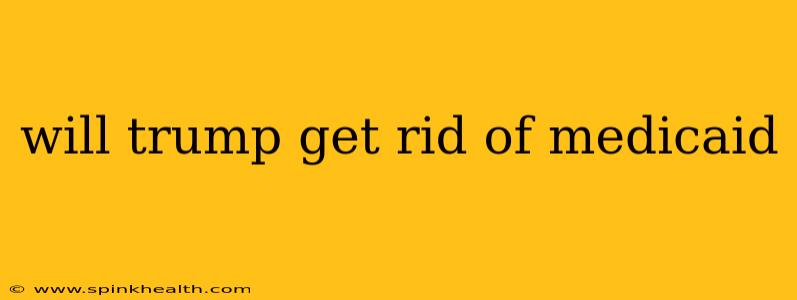Will Trump Get Rid of Medicaid? Unpacking the Complexities of Healthcare Reform
The question of whether Donald Trump would eliminate Medicaid has been a recurring theme in American political discourse. It's a complex issue with no simple yes or no answer, as his actual policies and proposed changes involved a nuanced approach rather than outright abolishment. Let's delve into the specifics, exploring his past actions and statements to better understand the situation.
It's crucial to remember that Trump's stance on Medicaid wasn't static. His proposals evolved throughout his presidency, influenced by political pressures and shifting priorities. While he consistently aimed to reduce the federal government's financial burden on healthcare, his methods varied considerably.
What were Trump's actual proposals regarding Medicaid?
Trump's administration didn't propose outright eliminating Medicaid. Instead, their strategy focused on significant restructuring and shifting responsibilities to the states. This involved proposals like block granting Medicaid funding, which would provide states with a fixed amount of money annually, rather than the current system of open-ended federal matching funds. This approach would give states more control over their Medicaid programs but also potentially limit access for some recipients.
The goal, as articulated by the administration, was to empower states to design programs tailored to their specific needs and populations, leading to greater efficiency and cost savings. However, critics argued this could lead to reduced benefits and coverage for vulnerable populations. The potential impact varied drastically depending on the state’s approach, with some states possibly expanding coverage while others significantly curtailed it.
Could Block Granting Lead to Medicaid Cuts?
This is where the debate becomes truly complex. Block granting, while giving states more autonomy, introduced the very real risk of Medicaid cuts. With a fixed amount of money, states facing rising healthcare costs or increased demand for services might be forced to make difficult choices, potentially reducing benefits, eligibility criteria, or provider reimbursement rates.
The potential consequences of reduced funding are significant. Cuts could lead to:
- Reduced access to care: People might lose their Medicaid coverage entirely, or services might be reduced, leading to delayed or forgone essential medical care.
- Increased healthcare costs for individuals: Those who remain covered could face higher out-of-pocket expenses, such as increased co-pays and deductibles.
- Strain on healthcare providers: Reduced reimbursement rates could force healthcare providers to limit services or close down, particularly in underserved areas.
What happened to Medicaid under the Trump administration?
While Trump didn’t successfully eliminate Medicaid, his administration did implement policies that had a significant indirect impact. These included efforts to weaken the Affordable Care Act (ACA), which expanded Medicaid eligibility for millions of Americans. These actions, while not directly targeting Medicaid itself, contributed to a slower growth in Medicaid enrollment and potentially impacted the long-term sustainability of the program in some areas.
Would a future Trump presidency further impact Medicaid?
Predicting the future impact of any political figure on complex policy is inherently speculative. However, given Trump's past statements and actions, it's reasonable to expect that a future administration under him would continue to pursue reforms aimed at streamlining and controlling Medicaid costs. Whether this would lead to significant cuts or simply a reshaping of the program remains to be seen. The specifics would hinge on many factors, including the political climate, the composition of Congress, and the changing healthcare landscape.
In conclusion, the question of whether Trump would "get rid of" Medicaid is misleading. His approach was far more nuanced, focusing on restructuring and shifting control to states, creating a high potential for significant changes in the program's scope and access, rather than outright elimination. The ultimate impact would depend on various factors, and the debate over the consequences of his proposals continues to this day.

